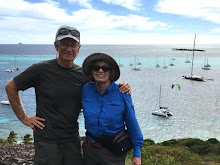Fast Going on the East Coast
Actually there were no problems until our second night at sea when we rounded Cape Canaveral at about 3 am. Just as we approached the channel, we started to lose our new AIS system, which identifies ships, their direction, speed, and next port. The ships, which were busily leaving and arriving at Port Canaveral, began blinking off our chart, one by one. A sudden flash of the chart system caused havoc as all the electronics reset themselves and the brand new battery suddenly measured 11.8. WHAT THE? Then the wind popped up to over 20 knots, shifting to directly behind us and causing the main sail to rattle and bang. After struggling to lower the main in bouncing seas, we turned our attention to the AIS/E-80 chart plotter problem. Removing our Sirius weather breaker and rebooting seemed to work, at least temporarily, and we made it without further incident into Fort Pierce by the next afternoon. We spent a much needed restful night at anchor in a cove just south of the Fort Pierce bridge.
Our plan had been to proceed from there with day sails since winds were to be in the 15-20 range and seas choppy. By morning the forecast had become more benign, in fact too benign, but winds were supposed to fill in to the south causing 6 foot seas on the following day . We motored in flat seas and decided to take advantage of the brief lull in winds to do another overnight and reach the safety of the Hawk Channel and the Florida keys before the winds churned up the seas. Good plan. The execution left something to be desired.
Fort Lauderdale at midnight, with all it's traffic. Fortunately, our AIS is fine. We know where they are and how to avoid them. At 1 am, off the coast of north Miami, a power boat without lights swooped up behind us and pulled along side. It was the Coast Guard, wanting to know who we were, where were we going, how many of us were aboard, and wanting to see our documentation. No one is sleeping yet. Immediately after that incident, our E-80/AIS system began doing its little flash dance again...of course as we were approaching the Miami entrance channel, with many anchored ships and barges to pass in the night. OK, leave the system off briefly and reboot, two people on deck to act as lookouts for any ship movement. This is a major irritation, but it is nothing compared to the blinking off of the system several hours later in the Hawk Channel, which is marked primarily by day beacons and pitch black of a moonless night. The Hawk Channel is also full of shallow water, mini-reefs, and sunken boats, marked by unlit posts. Get out the backup system, right? The hand-held GPS has developed a short. It comes up, but shuts off when we set it down. Backup system #2. Our brand new ipad is loaded with Navionics charts. We're still OK. Wrong, It turns out you have to download each set of maps separately....and we hadn't downloaded Florida. Our charts stopped in Georgia. Is it time to panic yet?
Rebooting the system once again, minus the radar and the AIS, the chart seems to function. So now it is about 4 am and no one has slept. Cookie goes below for some quick shut-eye. Thirty minutes later, a catamaran is chugging toward us in the dark. We can see a red port light, a green starboard light, and a white steaming light......all aimed at our starboard bow, coming in about 20 degrees from head on. This is NOT good. When he turns slightly north, Rick turns south. Possibly in the night , the man steering had a brain freeze, we'll never know, but he turned suddenly south speeding his engines to pass directly across our bow, not more than 20 yards away, Rick slammed the engines into reverse. Cookie bolted out of bed and into the cockpit, wide-eyed to see the huge catamaran as it passed along our port side in the dark. Now it's about 5 am, and still no one has slept, nor can they at this point, with all the adrenalin rushing through the system. That was one of three boats which passed us at night, but the only one with an idiot at the wheel.
Our orginal goal was to reach Rodriguez Key and anchor, but we arrived at 9am and pushed on to Marathon. The long expected winds finally arrived and we opted for the peace and security of a Marathon City Marina mooring ball, safely out of the winds in Boot Key. In fact, after 3 of 4 sleepless nights pushing south, we opted for a day of recovery at the mooring ball in addition.
Ah, the beauty of relaxing in a safe harbor, with no worries of waves or dragging anchors. The day trip from Marathon was wonderful, 18-22 knots of wind, directly behind us. We let out the jib and enjoyed a downwind sleigh ride at a gentle 6 knots all the way. So, on a Tuesday, just 5 days after leaving, we arrived in Boca Chica, greeted by great friends, standing by to receive our lines. We're home again.






0 Comments:
Post a Comment
Subscribe to Post Comments [Atom]
<< Home